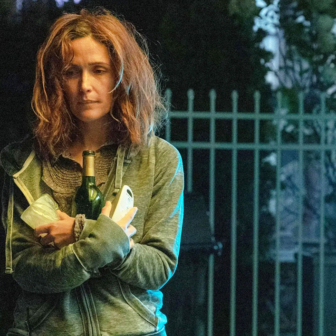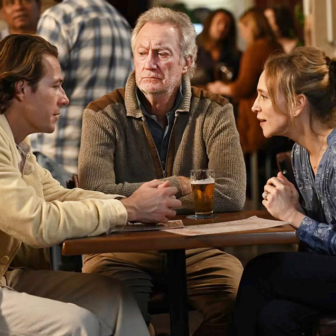If you have had all the exposure you need to the wild action and CGI of, say, the Marvel movies or the Mission Impossible franchise, and if you feel you’d like a movie about actual people, Driving Madeleine may well be the film for you. By “actual people,” I don’t mean characters drawn from real life but characters observed and presented as if they were.
What is it about people in cars that can make for such riveting film fare? It doesn’t have to be as uniquely strange as Steven Knight’s Locke (2013), in which a single man on a long drive is the only figure seen in the whole film as he engages in a series of mobile phone calls. Think of Fred Schepisi’s dealings with four men in a car as they make their way to distribute an old friend’s ashes from a pier in Last Orders (2001).
But it was Bruce Beresford’s Oscar-winning Driving Miss Daisy (1989) that came to mind as I watched the new French film Driving Madeleine, and not just because their titles are so similar. Both films focus on the unsought and initially improbable relationship that develops between an elderly woman and her chauffeur/driver.
Driving Madeleine is my main concern here, but we rarely come to a film without intertextual baggage that can strengthen our response. Christian Carion’s film has proved to be very popular with what I suppose must be thought of as art house audiences. On my viewing it for the second time in Melbourne last week the only seat available was in the front row, up against the screen.
Having opened with the image of a TAXI sign, the film shifts to the face of its driver, Charles (Dany Boon), looking far from cheery as he drives along the banks of the Seine with the Eiffel Tower in sight. A male passenger argues with him about directions and they exchange rebukes; left alone, Charles reproaches himself — “I’m such a jerk” — before receiving a phone call offering a well-paying passenger. The next shot gives him, and us, a first view of Madeleine (Line Renaud).
Her thoughtful face contrasts at first with his surly expression. She talks; he doesn’t. She calls him a “charmer” when, at her bidding, he guesses her age to be a mere eighty when she is actually ninety-two, which is later revealed to be twice his age.
Charles is not going to be easily won into cheery chat, but Madeleine is bent on filling him in about her past, and the film goes into flashback as she recalls her romantic life. As a young woman during the second world war (played in this earlier incarnation by Alice Isaaz), she fell in love with an American soldier, Matt (Elie Kaempfen), by whom she had a son after he returned home to the United States and married someone else. That romance, set in the days after the US liberation of France, is played with sensuality and passion, accompanied on the soundtrack by “The Sunny Side of the Street.” We see how this past has helped create the tolerant, intelligent ninety-two-year-old in the back seat of the taxi.
As well as recalling how she dealt with the loss of Matt, she recalls the raising of their son Matthieu (Hadriel Roure, later Thomas Alden), made difficult because of the violent man she married, Ray (Jérémie Laheurte), who beats both her and her son. Her effort to stop this violence led to her being charged with attempted murder.
To go any further would involve spoilers, though this is not the sort of film that generally offers sensational surprises; what matters is how the traumatic aspects of Madeleine’s earlier life and her nonagenarian tranquillity belong to the woman at the film’s centre.
Charles’s life has been quite different — as he says, “I spend my life in this taxi,” twelve hours a day — and we only hear about his domestic life near the film’s end. He begins to smile, deepening the rapport between driver and passenger that will lead the film towards its moving but utterly unsentimental ending.
As is the case with Driving Miss Daisy, both protagonists acknowledge the relationship that has formed but in very different ways, each of which is completely satisfying. There are contrasts between the two women — Miss Daisy is much more austere than the benign Madeleine — and the two drivers: Daisy’s is cheery and outgoing while Charles has to work his way from surliness towards kindliness.
Both films are derived from screenplays that understand how much dramatic content can be revealed by concentrating on faces, and of course the cinematographer, editor and director all contribute significantly to how our attention is held by this focus.
But what stays in the viewer’s mind will be the flawless acting in the key roles. Both Jessica Tandy and Morgan Freeman deservedly won Oscars for their incarnations of passenger and driver in Miss Daisy, and it would be good to imagine a similar outcome for those who illuminate Christian Carion’s film. Carion’s subtle direction of Cyril Gely’s screenplay counts on the performances of Line Renaud and Dany Boon to engage audience interest in two lives that find they have more to share than might have been expected. •




